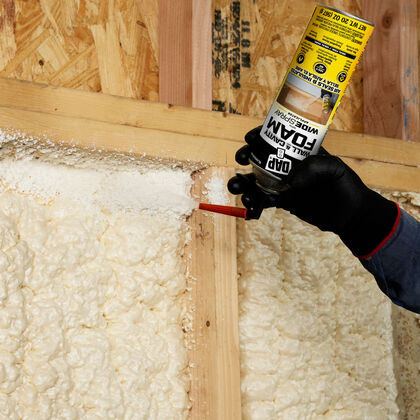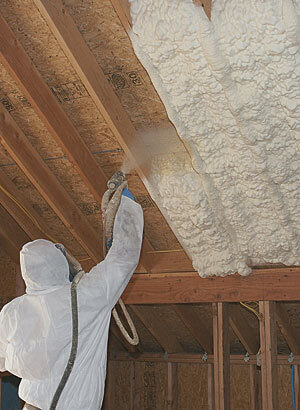The Ecological Impact of Spray Foam: Sustainability Considerations
The Ecological Impact of Spray Foam: Sustainability Considerations
Blog Article
Spray Foam: The Ultimate Service for Air Sealing and Insulation
Spray foam insulation has emerged as a leading service for reliable air sealing and thermal insulation, supplying a special combination of residential or commercial properties that establish it apart from conventional techniques. Recognizing the full scope of its advantages, installation processes, and comparisons with various other insulation types is important for making informed choices.
What Is Spray Foam?
Spray foam is a functional insulation product that integrates the concepts of air sealing and thermal resistance to boost power effectiveness in structures. Made up largely of polyurethane or various other similar compounds, spray foam is applied as a fluid that increases upon contact with surface areas, developing a solid, continual layer of insulation. This distinct building enables it to fill voids, splits, and gaps that standard insulation products might neglect, supplying an exceptional air seal.
There are two primary sorts of spray foam: open-cell and closed-cell. Open-cell spray foam is lighter and much more adaptable, using superb audio absorption and a lower R-value per inch - Spray Foam. In comparison, closed-cell spray foam is denser, offering a greater R-value, dampness resistance, and added architectural stability to developing elements
The application procedure generally entails specific tools, making certain a smooth application that follows various substratums, including metal, timber, and concrete. This flexibility makes spray foam suitable for both brand-new buildings and retrofitting existing structures. Its capability to create an airtight obstacle substantially contributes to reducing energy usage and enhancing interior air top quality, therefore making it a preferred option amongst house owners and builders alike.
Advantages of Spray Foam Insulation
One of one of the most significant advantages of spray foam insulation is its remarkable ability to develop a constant air barrier, which effectively reduces energy loss. Unlike traditional insulation materials, spray foam broadens to fill up spaces and cracks, making sure that air leakage is dramatically lowered. This characteristic not only enhances energy performance however likewise causes reduce energy expenses with time.
Furthermore, spray foam insulation provides premium thermal resistance, contributing to a much more steady interior environment. Its high R-value per inch enables efficient insulation in restricted spaces, making it excellent for attics, wall surfaces, and crawl spaces. The moisture-resistant properties of spray foam assistance avoid mold and mildew growth, advertising much healthier living conditions.
One more important benefit of spray foam insulation is its sound-dampening qualities (Spray Foam). It efficiently decreases noise transmission in between areas, developing a quieter and much more comfy home environment. The sturdiness of spray foam also attracts attention, as it does not droop or settle with time, maintaining its performance throughout its lifespan
How Spray Foam Works
Recognizing exactly how spray foam insulation works is vital for valuing its effectiveness in air securing and thermal resistance. Spray foam insulation contains two main parts: isocyanate and polyol resin. When these elements are mixed, they undergo a chain reaction that creates the material to broaden swiftly, producing a dense foam that fills up gaps, tooth cavities, and fractures.
As the foam expands, it follows surfaces, forming an impermeable seal that considerably minimizes air seepage. This particular makes spray foam insulation extremely efficient at stopping drafts and moisture infiltration, which can cause energy loss and damages in time. Furthermore, the closed-cell version of spray foam uses superior thermal resistance due to its rigid structure, effectively decreasing warmth transfer.
The distinct homes of spray foam enable it to conform to uneven surfaces, making sure detailed coverage and a smooth obstacle. Therefore, spray foam insulation not only enhances energy performance however additionally adds to enhanced interior air top quality by decreasing the accumulation of irritants and toxins. Ultimately, comprehending the mechanics behind spray foam highlights its role as a superior option for insulation and click here now air sealing in both industrial and residential applications.
Installation Refine Review

Prior to installation, the area must be sufficiently cleaned up and prepped, ensuring that surface areas are cost-free from particles, dirt, and wetness. This step is essential since impurities can compromise adhesion and general performance. When the location is prepared, the application includes mixing the 2 parts of the spray foam, which broadens upon get in touch with and fills up gaps successfully.
Trained experts must carry out the setup, using specific tools to guarantee uniform insurance coverage and optimal thickness. Safety precautions, consisting of wearing safety equipment and ensuring appropriate air flow, are necessary during this process. After application, the foam commonly cures rapidly, creating a solid obstacle that boosts power performance.
Contrasting Spray Foam to Standard Insulation
When evaluating insulation alternatives, spray foam insulation stands out in comparison to standard materials such check these guys out as fiberglass and cellulose. Unlike fiberglass and cellulose, which can allow air infiltration, spray foam expands upon application, loading crevices and voids to produce an impermeable seal.
Furthermore, spray foam offers a greater R-value per inch than traditional insulation kinds, providing more effective thermal resistance in a thinner account. This particular is particularly useful in rooms with minimal cavity deepness. Spray foam is immune to dampness and mold growth, which can be a substantial concern with cellulose and fiberglass, especially in moist atmospheres.
Nevertheless, spray foam insulation generally brings a greater ahead of time cost than its conventional equivalents. Home owners should evaluate this initial financial investment versus long-term energy financial savings and performance benefits. Ultimately, while both insulation types offer their function, spray foam emerges as an extra innovative remedy for contemporary insulation requirements, especially in terms of air securing and thermal effectiveness.

Conclusion
In recap, spray foam insulation represents a very effective option for attaining optimal air securing and thermal resistance. Its distinct buildings, including moisture resistance and audio dampening, make it website here suitable for various applications in both new buildings and retrofitting jobs (Spray Foam). Although the first prices might be greater compared to standard insulation products, the lasting advantages, such as substantial power financial savings and boosted interior air quality, validate the investment and emphasize its value in modern building methods.
Spray foam insulation has actually emerged as a leading option for efficient air sealing and thermal insulation, providing a distinct combination of buildings that establish it apart from standard techniques.Spray foam is a versatile insulation material that combines the concepts of air sealing and thermal resistance to enhance power effectiveness in buildings.When reviewing insulation choices, spray foam insulation stands out in contrast to standard materials such as fiberglass and cellulose. Inevitably, while both insulation types offer their purpose, spray foam arises as a much more advanced solution for modern insulation demands, especially in terms of air securing and thermal effectiveness.
In recap, spray foam insulation represents a very efficient option for achieving optimum air sealing and thermal resistance.
Report this page